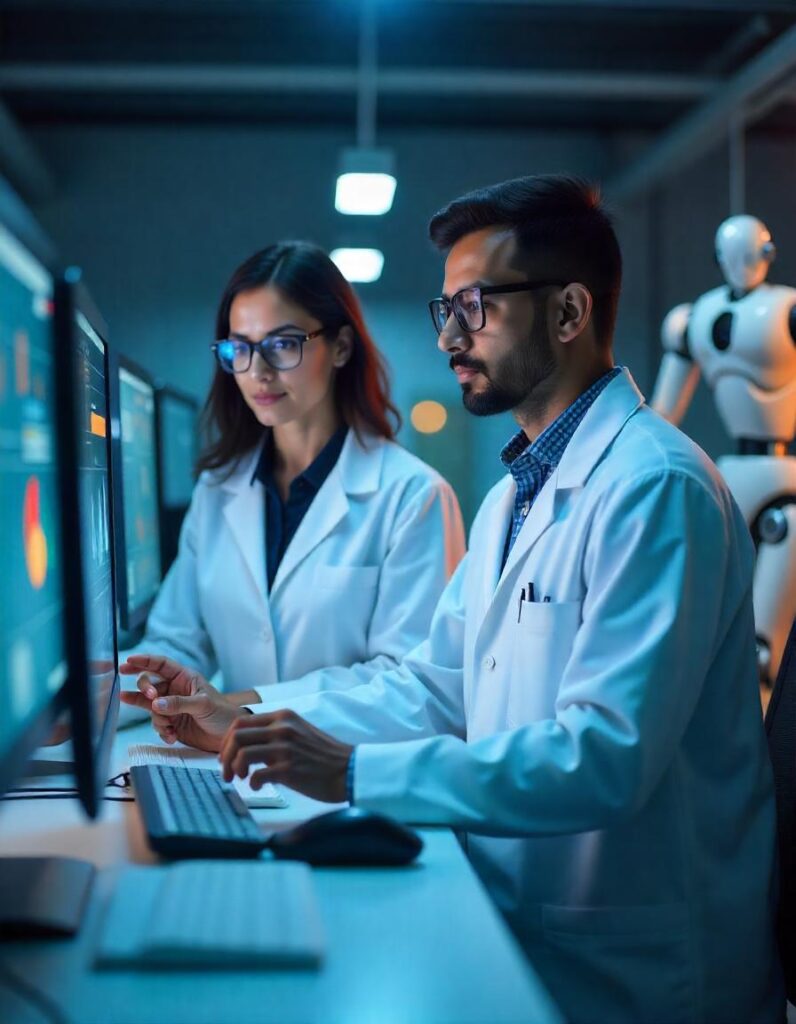Introduction
One of the most disruptive technologies of the twenty-first century, artificial intelligence (AI) is quickly changing economies, industries, and every aspect of our life. Artificial intelligence (AI) is leading the way in innovation, from self-driving cars and virtual assistants to sophisticated data analytics and medical diagnostics. It has the potential to significantly increase productivity, efficiency, and decision-making while also posing considerable ethical issues and obstacles.
This essay will examine the history of artificial intelligence (AI), its uses now, its prospects for the future, and the social ramifications of this quickly developing technology.
What is Ai?
Fundamentally, artificial intelligence is the capacity of machines to carry out operations that ordinarily call for human intelligence. These include identifying trends, drawing conclusions from information, deciphering language, making judgments, and resolving challenging issues. Artificial intelligence (AI) systems mimic cognitive functions including observation, learning, and reasoning using data and algorithms.
The Development and Evolution of AI
AI has been discussed for many years; the earliest talks date back to the middle of the 20th century. The phrase “artificial intelligence” was originally used in 1956 during the Dartmouth Conference, a gathering of mathematicians and physicists to discuss the prospect of building robots that could mimic human intelligence.
Throughout the ensuing decades, artificial intelligence (AI) advancement was gradual and frequently marked by ups and downs, dubbed “AI winters.” The early systems created during this time were constrained by the available technology and lacked the data and processing capacity needed for sophisticated artificial intelligence.But over the last 20 years, there has been a rebirth of AI, driven by three main factors:

Increased Computing Power
Hardware advancements, especially the development of sophisticated GPUs (graphics processing units), have made it possible for AI systems to process enormous amounts of data and carry out complex computations incredibly quickly.
Big Data
AI now has the resources it needs to learn, develop, and hone its algorithms thanks to the abundance of data produced by the internet, social media, and linked gadgets.
Advancements in Machine Learning
One area of AI that has become a major driver of recent developments is machine learning. In order for systems to recognise patterns and generate predictions with minimal human intervention, this procedure involves training them on large datasets. Neural networks that are modelled after the human brain are used in deep learning, a subfield of machine learning, to achieve even more sophisticated results.
Current Applications of AI
These days, artificial intelligence is incorporated into many facets of our daily life, frequently in ways we are unaware of. The following are a few of the most well-known uses of AI in diverse industries:
Healthcare
AI is transforming the diagnosis, treatment, and management of diseases, and it is having a major impact on healthcare. Medical image analysis, early cancer detection, and customised treatment regimens based on patient data are all possible with AI-powered systems. AI is also utilised to create novel medications, remotely check on patients’ health, and boost healthcare systems’ effectiveness.
Finance
AI is utilised in the financial industry for risk assessment, fraud detection, and customised financial planning. AI algorithms are used by banks and financial organisations to forecast stock prices, analyse market patterns, and improve trading tactics. AI-powered robo-advisors provide individual investors automated portfolio management and investing guidance.
Transportation
One of the most talked-about uses of AI, self-driving cars, has the potential to revolutionise the transportation sector. In an effort to develop safer and more effective transportation networks, businesses like Tesla, Waymo, and Uber are making significant investments in autonomous car technology. AI is also utilised in supply chain management and logistics to improve the effectiveness of transportation networks and optimise delivery routes.

Retail
AI is being used by retailers to improve consumer experiences through chatbots, inventory management, and tailored suggestions. AI algorithms are used by e-commerce sites like Amazon to make product recommendations based on user preferences and browsing activity. AI-powered solutions can monitor inventory, forecast demand, and improve pricing tactics in physical businesses.
Entertainment
AI is used by streaming services such as Netflix, YouTube, and Spotify to suggest material to consumers based on their listening or viewing preferences. With algorithms that can produce music, artwork, and even movie scripts, artificial intelligence is also used in content production.
Manufacturing
AI is utilised in the manufacturing sector to increase productivity, cut waste, and uphold quality standards. Predictive maintenance systems keep an eye on the condition of equipment and avert malfunctions, while AI-powered robots and machines can precisely do complicated jobs.
The Future of AI:Opportunities and Challenges
AI has enormous potential to spur innovation and address some of the most important issues facing the globe as it develops further. To guarantee its responsible and moral development, it also raises important issues that need to be resolved.
Healthcare Advancements
AI has the ability to completely transform personalised medicine by assisting physicians in customising care for each patient according to their medical history and genetic composition.
Climate Change Solutions
By maximising energy use, enhancing agricultural productivity, and supporting the creation of sustainable technology, artificial intelligence (AI) can significantly contribute to the fight against climate change.
Automation of Repetitive Tasks
AI can automate repetitive and mundane tasks across industries, freeing up human workers to focus on more creative and strategic endeavours.
Challenges
Job Displacement: Concern over job displacement is growing as AI and automation technologies develop, especially in sectors where repetitive tasks are prevalent. Employees will need to learn new skills in order to adjust to the shifting nature of the labour market.
Ethical Concerns: ethical concerns are brought up by AI, namely in relation to algorithmic bias, data privacy, and the possibility of dangerous applications of AI (such as autonomous weapons). It is crucial to guarantee accountability, transparency, and equity in AI systems.
Regulation and Governance:To ensure that AI is developed and used properly, governments and regulatory agencies must collaborate to create rules and regulations that control its usage.
AI and Society: A Balancing Act
AI’s effects on society are wide-ranging and intricate. Even though it has many advantages in fields like healthcare, education, and economic expansion, its possible drawbacks must be carefully considered. To maximise AI’s positive effects while reducing its negative ones, it will be crucial to make sure that ethical standards, openness, and inclusion are taken into consideration when developing AI technology.
Stakeholders, including governments, corporations, and individuals, must have constant conversations about the role of AI in society as it develops. Working together, the public and private sectors may help create policies that uphold values and human rights while encouraging innovation.
Conclusion
A new era of human achievement is being fuelled by artificial intelligence, which is more than just a technological fad. AI will continue to change industries, open up new opportunities, and bring up significant issues regarding the future of labour, ethics, and human interaction as it becomes more ingrained in our daily lives. We can guarantee that AI acts as an instrument for constructive change and benefits society overall by utilising its potential and resolving its issues.

